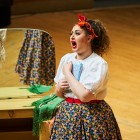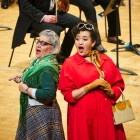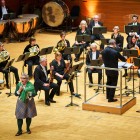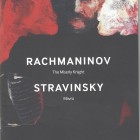Mavra 2022Scottish Opera
Read more about the opera Mavra
Stravinsky's delightfully frivolous farce Mavra was given a single performance as an afterpiece following the Scottish premiere of The Miserly Kinight by Rachmaninov.
The soprano role of Parasha was sung by Anush Hovhannisyan. After several years studying in Glasgow, Hovhannisyan has since gone on to great things. She has appeared several times at Covent Garden in the title role of La traviata and is recognised as an excellent interpreter of Violetta, which was the role of her Scottish Opera debut. It was good to see Hovhannisyan back in Scotland, if only for a single evening in a completely different style of part.
Alexey Dolgov has not yet sung in a staged performance in Scotland, but it is likely that these one-off concerts can be fitted more easily into a busy international schedule. Having previously sung Tchaikovsky and Mascagni with Scottish Opera, it was good to hear him in Rachmaninov and Stravinsky, particularly when the latter allowed him to show off his talent for comedy. He was able to let his hair down (not literally as it was tightly wrapped in a headscarf) with a ribald Mrs Mopp-style presentation of the Hussar in drag.
The Mother and Neighbour, both sung in fruity contralto tones, were able to add to the farcical goings-on. Director Laura Attridge clearly took the view that over-exaggeration was not possible in this particular work, and very effective this approach was too.
Stuart Stratford kept a tight rein on his band, much reduced from the Rachmaninov. By 1920 Stravinsky was writing crisply rhythmical sounds totally different from the familiar big ballets. This made for a refreshing cold shower after the stifling gloom of The Miserly Knight.
On an historical note, the British premiere, in a staging imported from Hamburg, was presented at an early Edinburgh International Festival in 1956. On that occasion it was preceded by another Stravinsky work, the harrowingly tragic Oedipus Rex.



